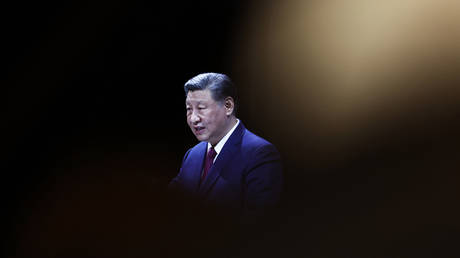Will EU Block China Economic Silk Road?
by F. William Engdahl, New Eastern Outlook:
 In the clearest sign to date, EU Ambassadors to Beijing have just released a document critical of China’s vast Belt, Road Initiative or New Economic Silk Road infrastructure project. All EU ambassadors excepting Hungary signed off on the paper in a declaration of growing EU opposition to what is arguably the most promising economic project in the past century if not more. The move fits conveniently with the recent Trump Administration targeting of China technology trade as tensions grow.
In the clearest sign to date, EU Ambassadors to Beijing have just released a document critical of China’s vast Belt, Road Initiative or New Economic Silk Road infrastructure project. All EU ambassadors excepting Hungary signed off on the paper in a declaration of growing EU opposition to what is arguably the most promising economic project in the past century if not more. The move fits conveniently with the recent Trump Administration targeting of China technology trade as tensions grow.
Twenty-seven of the 28 EU ambassadors to China have just signed a report sharply critical of China’s BRI development. Ironically, as if the EU states or their companies did not do the same, the report attacks China for using the BRI to hamper free trade and put Chinese companies at an advantage. The document claims that the Chinese New Economic Silk Road project, unveiled by Xi Jinping in 2013, “runs counter to the EU agenda for liberalizing trade and pushes the balance of power in favor of subsidized Chinese companies.”
Two Models of Global Development
Chinese President Xi Jinping first proposed what today is the Belt, Road Initiative, today the most ambitious infrastructure project in modern history, at a university in Kazakhstan five years ago in 2013. Despite repeated efforts by Beijing to enlist the European Union as a whole and individual EU member states, the majority to date have remained cool or distant with the exception of Hungary, Greece and several eastern EU countries. When China officially launched the project and held an international conference in Beijing in May 2017, it was largely boycotted by EU heads of state. Germany’s Merkel sent her economics minister who accused the Chinese of lack of commitments to social and environmental sustainability and transparency in procurement.
Now 27 of 28 EU ambassadors in Beijing have signed a statement suspiciously similar to that of the German position. According to the German business daily, Handelsblatt, the EU ambassadors’ declaration states that the China BRI “runs counter to the EU agenda for liberalizing trade and pushes the balance of power in favor of subsidized Chinese companies.” Hungary was the only country refusing to sign.
The latest EU statement, soon to be followed by a long critical report on the new Silk Road from the EU Commission in Brussels, fits very much the agenda of the Trump Administration in its latest trade tariffs against Chinese goods that alleges that Chinese companies force US partners to share technology in return for projects in China.
Moreover, the EU Commission has just released a long report on China in connection with new EU anti-dumping rules. The report declares that the fact that China is a state-directed economy with state-owned enterprises engaging in the construction of the Belt Road Initiative is in effect “the problem.” China answers that her economy is in the “primary stage of socialism”, has a “socialist market economy” and views the state-owned economy as the “leading force” of national development. The targeting of China’s state enterprises and of its state-directed economic model is a direct attack on her very economic model. Beijing is not about to scrap that we can be sure.
The latest stance of EU member states, led by Germany and Macron’s France, is an attempt to pressure China into adhering to the 2013 World Bank document, China 2030. There, as we noted in an earlier analysis, it declared that China must complete radical market reforms, to follow the failed Western “free market” model implemented in the West since the 1970’s with disastrous consequences for employment and stability. China 2030 states, “It is imperative that China … develop a market-based system with sound foundations…while a vigorous private sector plays the more important role of driving growth.” The report, cosigned then by the Chinese Finance Ministry and State Council, further declared that “China’s strategy toward the world will need to be governed by a few key principles: open markets, fairness and equity, mutually beneficial cooperation, global inclusiveness and sustainable development.”
As Xi Jinping established his presidency and domination of the Party after 2013, China issued a quite different document that is integral to the BRI project of President Xi. This document, China 2025: Made in China, calls for China to emerge from its initial stage as an economy assembling technologies for Apple or GM or other Western multinationals under license, to become self-sufficient in its own technology. The dramatic success of China mobile phone company Huawei to rival Apple or Samsung is a case in point. Under China 2025 the goal is to develop the next transformation from that of a cheap-labor assembly economy to an exporter of Made in China products across the board from shipbuilding in context of the Maritime Silk Road to advanced aircraft to Artificial Intelligence and space technologies.
Refusal to Constructively Engage
By its recent critical actions, the EU Commission and most EU states are, while not slamming the door shut on what is developing as one of the few positive growth spots outside military spending in the world today, doing everything to lessen the engagement of EU states in the BRI.
For its part, China and Chinese state companies are investing in modernizing and developing deep water ports to handle the new Silk Road trade flows more efficiently. China’s State Oceanic Administration (SOA) is responsible for developing the so-called “blue economy” maritime ports and shipping infrastructure, the “belt” in Belt and Road. Last year China’s marine industries, exploitation of ocean resources and services such as tourism and container and other transport, generated the equivalent of more than $1 trillion turnover. Little wonder that China sees investment in ocean shipping and ports a high priority.
Sea lane shipping via the Malacca Strait and Suez is at present China’s life line for trade to EU states and vulnerable to potential US interdiction in event of a serious clash. Today twenty-five percent of world trade passes through the Malacca Strait. Creation of a network of new ports independent of that vulnerable passage is one aim of the BRI.
The Piraeus Example
China’s Maritime Silk Road envisions directing state investment into key sectors such as acquisition of port management agreements, investment in modernized container ports and related infrastructure in select EU states.
At present the most developed example is the Greek port of Piraeus, operated under an agreement with the Chinese state company, COSCO, as port operator. Modernization and more than €1.5 billion investment from China has dramatically increased the port’s importance. In 2016 Piraeus’s container traffic grew by over 14 percent and COSCO plans to turn Piraeus into the fifth largest European port for container traffic. Before COSCO, it was not even in the EU top 15 in 2007. In 2016 COSCO bought 51% of Piraeus Port Authority for €280 million, and now owns 66%. Last year Piraeus Port, COSCO and Shanghai Port Authority, China’s largest container port, signed a joint agreement to further boost trade and efficiency at Piraeus. Greek Deputy Economy Minister Stergios Pitsiorlas said at the time, “The agreement means that huge quantities of goods will be transported to Piraeus from Shanghai.”
As the economically-troubled Greek economy produces few products China needs, China has encouraged growth of a mainstay of Greece’s economy, tourism trade with China. This year an estimated 200,000 Chinese tourists will visit Greece and spend billions there. As Piraeus is also a port for luxury cruise liners, Chinese cruise operators are servicing that as well. China company Fosun International, engaged in modernizing the former site of Athens Airport into one of the biggest real-estate projects in Europe, is also interested in investing in Greek tourism. Significantly, they own a share in Thomas Cook Group and are designing holiday packages aimed at the huge China tourist market. Fosun sees 1.5 million Chinese tourists in Greece in the next five years and is investing to accommodate at least a fair share.



